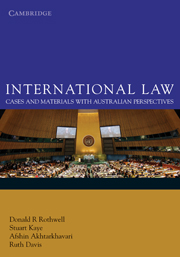Book contents
- Frontmatter
- Contents
- Preface
- About the authors
- Acknowledgements
- Table of cases
- Table of statutes
- Table of treaties and other international instruments
- Abbreviations
- 1 The nature of international law
- 2 Sources of international law
- 3 Law of treaties
- 4 International and municipal law
- 5 International legal personality
- 6 Sovereignty over territory
- 7 Jurisdiction
- 8 State responsibility
- 9 Human rights
- 10 Law of the sea
- 11 International environmental law
- 12 Enforcement of international law
- 13 The peaceful settlement of international disputes
- Index
- References
10 - Law of the sea
- Frontmatter
- Contents
- Preface
- About the authors
- Acknowledgements
- Table of cases
- Table of statutes
- Table of treaties and other international instruments
- Abbreviations
- 1 The nature of international law
- 2 Sources of international law
- 3 Law of treaties
- 4 International and municipal law
- 5 International legal personality
- 6 Sovereignty over territory
- 7 Jurisdiction
- 8 State responsibility
- 9 Human rights
- 10 Law of the sea
- 11 International environmental law
- 12 Enforcement of international law
- 13 The peaceful settlement of international disputes
- Index
- References
Summary
Introduction
The international law of the sea has developed over many hundreds of years. Modern principles can be traced back to the 17th-century debate between Grotius and Selden over whether or not nations had the right to control areas of the sea. The main concern at that time was over access to fishing grounds and trading routes; today's maritime interests have expanded to include the laying of submarine cables, mining of deep seabed resources, control of people smuggling and other transnational crimes, maintenance of national security, and conservation of high seas biodiversity, to name a few. Although many of the principles of customary international law in this area are well established, the law of the sea is today dominated by the 1982 United Nations Convention on the Law of the Sea (LOSC), a monumental agreement that provides the framework for international cooperation in maritime areas.
Freedom of the seas
The current framework of maritime zones, which define the relative rights and obligations of coastal and other States, has evolved against the background of a longstanding tension between States wishing to exercise control over parts of the high seas and those seeking to maintain free access. As O'Connell states:
The history of the law of the sea has been dominated by a central and persistent theme: the competition between the exercise of governmental authority over the sea and the idea of freedom of the seas. The tension between these has waxed and waned through the centuries, and has reflected the political, strategic and economic circumstances of each particular age.
- Type
- Chapter
- Information
- International LawCases and Materials with Australian Perspectives, pp. 501 - 555Publisher: Cambridge University PressPrint publication year: 2010

